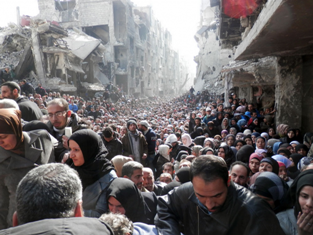With the third anniversary of the Syrian uprising this week, refugees are still pouring into neighboring states, food is used as a weapon of war and peace talks are stalled -- perhaps forever.
Statistics alone never tell the whole story but they are shocking nevertheless. Deaths are well over 100,000 and at least 680,000 people are injured. More than 9.3 million people are in need of basic food, shelter and medicine, including 6.5 million who fled their homes. And nearly 2.5 million Syrians have escaped to neighboring countries.
Jordan alone has 584,000 refugees, most of them in urban areas. But next month the United Nations plans another camp to accommodate up to 130,000 people. In tiny Lebanon, close to 1 million Syrians have sought refuge in a country of 4.5 million people.
And then there are the Palestinians. Chris Gunness, the gifted spokesman for the Palestinian relief agency, UNRWA, reports daily on clashes at Yarmouk near Damascus, once home to 160,000 Palestinians. The town has been reduced to rubble and ongoing fighting has prevented relief aid from reaching the area for nearly two weeks (see photo below)
But no one has been able to stop the war, with its 1,095 days of suffering.
"Syria is now the biggest humanitarian and peace and security crisis facing the world, with violence reaching unthinkable levels," UN Secretary-General Ban Ki-moon said in a statement.
Ukraine sucking out diplomatic airIn the last month, high-level talks between the United States and Russia, which is supplying the Damascus government with arms, have concentrated on the Ukraine. One diplomat said the confrontation over Ukraine has "sucked a lot of the bandwidth for diplomatic attention" on Syria.
The government of President Bashar al-Assad apparently believes it is winning on the ground and will eventually dominate much of Syria. Diplomats believe that is one reason it has blocked the Geneva peace talks.
More recently, Syria appears to be preparing for elections expected sometime in April or May in the middle of a war. If Assad is elected for another seven years, the Syrian opposition will walk out of the talks that are supposed to devise an interim transitional government.
Lakhdar Brahimi, the veteran Algerian negotiator for the United Nations and the Arab League, briefed the UN Security Council in private. Asked about the election, he told reporters afterwards:
"If there is an election, then my suspicion is that the opposition, all the oppositions, will probably not be interested in talking to the government."
No more peace talks?Brahimi, diplomats say, does not want to conduct a third round of Geneva talks unless there is agreement on an agenda. He proposed parallel talks on terrorism which Damascus refused, wanting terrorism as the first item of the main agenda. The opposition at the talks, which has its own problem in representing anti-Assad groups, has accepted the agenda and wants to discuss the transitional government.
Syria's answer to the fighting is that all opposition factions are terrorists. Three years ago the protests were relatively peaceful and the government responded with guns, arrests, torture and killings. And now Islamists from a variety of countries have arrived with guns, sometimes fighting each other. Helping the government are fighters from Iran and Lebanon's Hezbollah guerrillas.
The fractured opposition of liberal groups, Islamists, Sunni sectarians and others remains divided between those who favor a peaceful political solution and those who support continued armed resistance. The group in Geneva has been told by Western supporters to widen its base.
In short nothing significant will happen at the United Nations in ending the war in Syria, which is why the secretary-general has asked Russia and the United States to salvage the talks.
Not that the United Nations is idle. Humanitarian groups have delivered aid to Syria although they have been blocked in several regions. Barrel bombing of civilians, outlawed in a Security Council resolution, has stopped in Aleppo but moved south. And Russia did persuade Syria to get rid of its chemical weapons after it released poison gas last year. However, this too has lagged behind schedule.
UN picking up piecesBut when a major power is involved in a conflict, the world body is forced to take a back seat and pick up the pieces afterwards.
To mark the beginning of the fourth year, several reports have been released spelling out the carnage. An independent commission of inquiry established by the United Nations in Geneva said the Syria government and its allied militia systematically committed murder, torture rape and had no fear of being held accountable for their acts. It drew up a list of perpetrators, not released.
Dangerous place on earth to be a childThe suffering of children was highlighted in several reports. UNICEF, the U.N. Children's Fund said Syria "is now one of the most dangerous places on earth to be a child.
Fearing a lost generation, UNICEF said: "Children have lost lives and limbs, along with virtually every aspect of their childhood. "Some 3 million children in Syria and neighboring countries have no chance of going to school regularly -- about half of the school-age population."
Yet, once the Ukrainian crisis subsides, there is scant hope of ending the carnage soon. The United States is not going to intervene militarily and Russia seems to have endless patience with the Damascus regime -- unless steady international action over Ukraine leads to a compromise in Syria.

